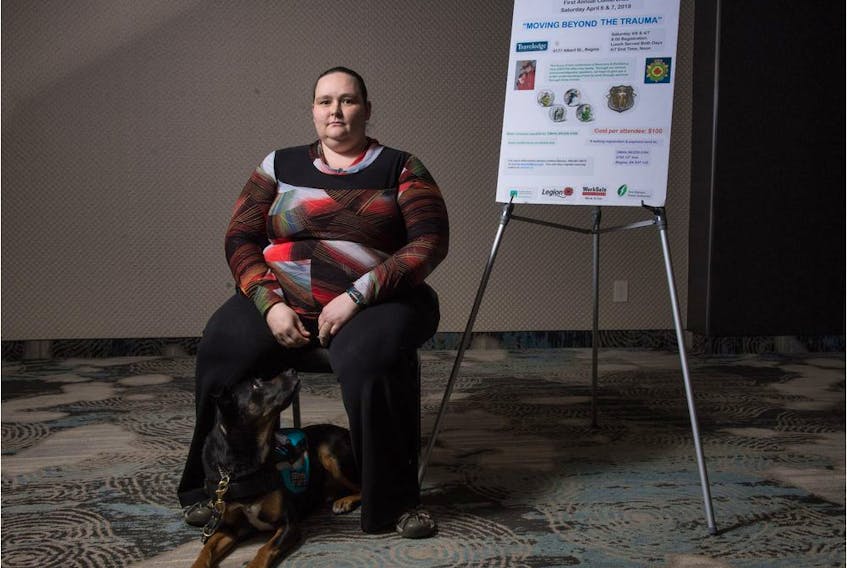A former EMT and 911 operator, Cathleen MacPhee credits her close friends and family for seeing the signs before she did.
“It was a close friend that tells me the story. I don’t remember it because I wasn’t recognizing it at the time, but there was a car ride we were on … and one of my dogs kept coming and nudging my shoulder,” she recounted. “I was like, ‘Go away. Get in the back seat. I’m driving and I need to be safe.”
What she didn’t know at the time was that her dog was actually picking up on what MacPhee later realized was anxiety stemming from her work and the trauma inherent in it. Seeing how her dogs were already helping her, her friends pushed her to consider getting a service dog.
“Then I had the fortune of meeting Chris Siddons, the founder of OSI-CAN, and he was in the process of training his service dog,” she said.
He put the idea on her radar and she went on to get her own service dog, Lyra, and create Tails of Strength, a training program for services dogs in the Regina area to help others like her.
“She has saved my life on more than one occasion and I don’t say that in the metaphorical sense,” said MacPhee who credits Lyra for intervening during a few mental health crises.
MacPhee shared her story at the first annual OSI-CAN conference in Regina on Sunday morning.
A joint project between the Saskatchewan division of the Canadian Mental Health Association and the Royal Canadian Legion (Saskatchewan Command), OSI-CAN helps veterans and first responders deal with PTSD and operational stress injuries through peer support groups, equine psychotherapy and financial support to get a service dog.
Costing anywhere between $15,000 and $30,000 to fully raise and train a service dog, it’s no small hurdle to get one, but MacPhee says it’s well worth it. Although Tails of Strength supports people with a variety of disabilities, at the conference she focused on psychiatric service dogs which can be trained to help with symptoms like anxiety, memory loss, night terrors, hyper vigilance, dissociation, hallucinations and more.
They can be trained to find lost keys or medication, lead their handler to a safe location and even turn lights on to wake handlers from a nightmare or night terror. Psychiatric service dogs can even help ground owners in reality by the mere fact that they don’t react to a hallucination, indicating to the owner that what they are seeing isn’t real.
“(Service dogs) can bring back their independence, their mobility, their psychological safety,” said MacPhee.
She also addressed the dos and don’ts of public encounters with a service dog. If you come across a handler and their service dog, do not pet or talk to the dog because doing so can distract them and have negative impacts on the handler.
“The biggest thing at this point, I think most of us in the service animal community would like to see is some sort of certification or licensure” as well as a provincial service animal act, MacPhee noted.
“It’s going to make it easier when we can go to businesses and we can educate and say here’s the piece of legislation. This is what your rights as a business owner are and these are the rights of the handler,” she said.
She said handlers rely on the Saskatchewan Human Rights Commission to assert their rights, but provincial legislation and licensing would add extra credibility to the service dog community.
“When I look back now, (I had) lots of anxiety, lots of nightmares, lots of cognitive challenges,” recalls MacPhee of the how the trauma of her work impacted her. “(Lrya’s) given me my life back.”
MacPhee can be contacted through her Facebook page, Tails of Strength.
Copyright Postmedia Network Inc., 2019









